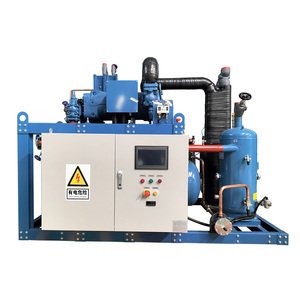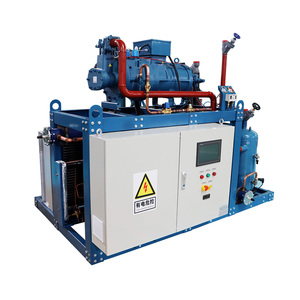(395 products available)










































































































































































































































A chiller is an industrial refrigeration system designed to remove heat from a process or environment using a refrigeration cycle. The Freon R22 water chiller is one type of chiller. Other types include absorption, air-cooled, and centrifugal chillers.
Cooling capacity:
The cooling capacity of a water chiller is typically measured in kW or BTUs per hour. The exact value is based on the specific model.
Operating temperature range:
Freon R22 water chillers can maintain the temperature of the chilled water within a specific range. This temperature range is usually -20~60℃.
Compressor:
Freon R22 water chillers are equipped with compressors of different types and sizes according to the model. The specific type and specifications are selected to match the design refrigerant.
Evaporator and condenser:
The structure and specifications of the evaporator and condenser are also key components of the performance of the water chiller. They are usually made of copper, aluminum, or stainless steel with good thermal conductivity.
Power consumption:
Power consumption refers to the chillers' power of water in kilowatts (kW). It usually corresponds to the cooling capacity of the water chiller.
For a Freon R22 chiller to work optimally and have a long service life, regular maintenance is imperative. The following are some common R22 chiller maintenance techniques.
Regular inspection:
Users should develop a regular inspection plan according to the usage of the refrigerating machine and carry out routine inspections. This helps to discover potential problems at an early stage and take timely corrective measures.
Check the refrigerant:
Ensure the appropriate levels of refrigerant. If there are issues, such as leakage or insufficient refrigerant, the user should invite professionals to inspect and repair them.
Clean and maintain the evaporator and condenser:
Over time, dust and impurities will accumulate on the surfaces of the evaporator and condenser, which will affect their heat dissipation performance. Therefore, users should clean these components periodically to ensure good heat dissipation.
Check the compressor:
Users should inspect the working status of the compressor regularly, such as the bearing's tension and lubrication, inspecting if there are any abnormal noises or vibrations, and ensuring its normal operation.
Maintain peripheral equipment:
Water coolers are usually required to work with some peripheral devices, such as water pumps, valves, etc. Users need to check and maintain these devices to ensure their normal operation.
Because of its powerful cooling capacity, affordability, and reliability, R22 chillers are still widely used in various industries.
Air conditioning systems
R22 chillers are widely used in large-scale air conditioning systems for commercial and industrial buildings. They provide central cooling for offices, hotels, shopping malls, and more. R22 chillers can meet the heavy demand by regulating the temperature of the whole building. Moreover, they are still important components in some residential air conditioning systems.
Food and beverage industry
In the production and storage process of food and beverages, precise temperature control is necessary to保证ensure product quality and safety. R22 chillers can help maintain the recommended temperature range during the processing, packaging, and storage of food and beverages.
Medical and pharmaceutical industry
In the pharmaceutical manufacturing process and pharmaceutical storage, R22 chillers can offer temperature control for maintaining the stability and efficacy of medications. Additionally, R22 chillers are also used in laboratories. They can provide temperature control for experiments, specimen preservation, and equipment cooling.
Plastic and chemical industry
R22 water chillers can provide cooling for various processes, such as injection molding, extrusion, and reaction vessels in the plastic and chemical industries. They help regulate equipment temperatures, control reaction rates, and prevent overheating.
Laser cutting and electroplating
In laser cutting machines, R22 water coolers provide cooling for laser generators and optical systems. For electroplating equipment, they regulate the temperature of electroplating solutions and baths. Both of them ensure the stable operation and precision of the equipment.
Data centers
R22 chillers can provide cooling for servers, network equipment, and other critical infrastructure in the data center. They help maintain optimal operating temperatures and preserve the reliable performance of IT equipment.
Determine the required cooling capacity:
The optimal temperature of the process, the temperature of the water in the environment, the pressure needed to perform the process, and the amount of heat generated by the equipment should all be considered while determining the desired cooling capacity. The amount of heat generated by the process per unit of time must be calculated once the required cooling capacity is known. The amount of heat is known as "thermal power," which is typically represented in kilowatts (KW).
Select the refrigerant:
It is important to take into account the refrigerant's environmental impact (Ozone Depletion Potential (ODP) and Global Warming Potential (GWP)), the efficiency of the refrigerant and compressor, and the availability of the refrigerant.
R22 is an effective refrigerant, but since it depletes the ozone layer, many places are phasing it out in favor of more ozone-friendly options like R410A. Businesses should think about changing their coolers to R410A water chillers or choosing alternatives like R210A or R1234ze that can use less refrigerant to achieve the same cooling effect.
Energy efficiency:
The chillers' energy efficiency must be taken into account, as they represent a sizable portion of an enterprise's energy expenses. Selecting a chiller with a high energy star rating might help to lower operational costs.
Consider the design and materials:
Focus on components like the evaporator, condenser, compressor, and expansion valve that are necessary to the chiller's functioning. High-quality copper or aluminum is used to manufacture effective heat exchangers for evaporators and condensers. Choose a chiller whose compressor employs cutting-edge, silent technology to guarantee that the cooling system runs quietly.
controller:
A cooling chiller's performance may be improved and more energy savings can be attained through proper control. Choose a chiller that has intelligent controls that can monitor and change the machine's working condition automatically to enhance the cooling efficiency.
Consider the service life:
When choosing a Freon chiller, the service life is also an important consideration. To choose a Freon chiller with a lengthy service life, one should take into account factors like the machine's dependability, the availability of spare parts, and the technical assistance.
Warranty and after-sales support:
Buyers should ensure a comprehensive warranty to safeguard their investment, and they should research the level of after-sales care available. A strong guarantee and dependable after-sales support can aid in resolving any problems that may occur with the chiller after it is purchased.
Q1: What is the difference between a chiller and a cooler?
A1: The terms "chiller" and "cooler" are often interchangeable. However, a chiller typically refers to a large machine used for industrial-scale refrigerating applications, while a cooler may imply a smaller, portable device.
Q2: What are the three types of chillers?
A2: The three main types of industrial chillers include absorption, water-cooled, and air-cooled chillers.
Q3: How long does a chiller last?
A3: On average, with good maintenance, a Freon chiller can last up to 20 years or more.
Q4: Are chillers energy efficient?
A4: Yes, depending on the type and condition, a chiller can save energy. Choosing the right chiller for an application can reduce energy costs by up to 50%.
Q5: Is R22 chiller bad?
A5: R-22 is being phased out due to its harmful effects on the ozone layer. Its production has significantly decreased, making R-22 refrigerant devices less desirable.